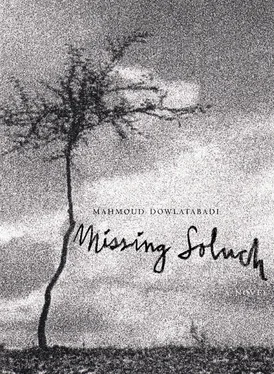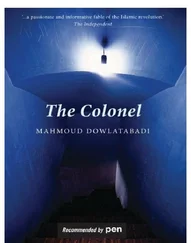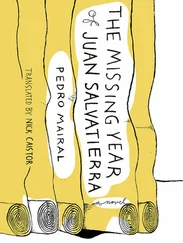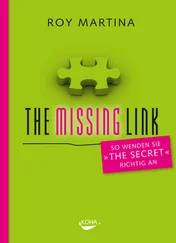“I suspect you’ll settle it soon. It’s not a permanent job; after a short while, they’ll be sent for sale and you’ll tie them all in a line and off they go!”
Abbas said, “Maybe he wants to graze them over the spring as well?”
“What an idea! I guess some people are so naïve they should never leave their homes, my brother! I really love these new foreign tractors though. Sardar Abdullah will have no choice but to get rid of his camels. It’s not because he wants to. And you think you can make a living with people like this around, running things as they do …? So, are you guys staying here?”
“No. We’ll come too.”
Morad straightened his back beneath the kindling. The brothers took their bags and tools and headed out, walking alongside Morad.
“Many of the others are leaving too. Ghodrat’s coming with me. We’ll go work for six months and then spend the winter relaxing by the hearth. We’ll take it easy. If we were to stay here, we’d never even be able to save up ten tomans . But what I’m surprised by is why you’re not coming?”
Abbas replied, “We have our own problems, brother!”
“And no one else does?”
Abrau asked, “Morad, have you been in a car until now?”
“How could I not have been? How do you think I’ve been to all these places? It’s no big deal!”
Abrau remained silent. Abbas said, “If it’s really heavy, set down that bundle and I can help you take it.”
Morad said, “What’s difficult isn’t the weight of this bundle; it’s that in this place there’s no value for the work you do. This kindling is one thing, because at least my mother will be able to heat up bread in the oven with it. But other work is useless. Outside, I can work for sixteen hours a day if I know I’ll be paid my due. You need to have a purpose for your work. By the way … I hear you’re going to be marrying off Hajer?”
Abbas and Abrau said nothing. They had no answer to Morad’s question. Morad didn’t push the matter any further.
When they reached the ramshackle homes of Zaminej, Morad said, “If you were to just wait a little while longer, you’d probably find a husband for Hajer who doesn’t have another wife! Goodbye.”
“Goodbye!”
Morad altered his course toward a path beside a fallow field toward his home, while the brothers continued along the high ridge along a ditch. Before they were very far from each other, Morad made a turn beneath his load and said in a half-audible voice, “In any case … if you wanted to leave … it’s better if we all went together.”
Abbas took the hoe in his hand and waved it. “Okay … We’ll let you know.”
Then they headed away down the slope of the ditch.
By the time the brothers reached Zaminej, the evening air brought a soothing cool with it. It was for a good reason that for the first month of spring, many of those who could afford to would not leave their places beside the hearth. Abrau held his sack tight against his back, raised his shoulders a little, and said to Abbas, “What do you say we should do? As the weather gets warmer, Ali Genav’s bath will become less busy. I don’t expect I’ll really have a reason to keep working there over the summer. Even now I think he’s keeping me there just out of politeness. He’s in a bind; his wife’s still unwell. But just as soon as he sorts things out, he’ll get rid of me. And it’s not as if I’m really earning much there. So if you want my opinion, I think we should join the others, going wherever they go. Something might come of it, no?”
Abbas said, “There’s plenty of time now. If things don’t go well, if we don’t join this group, we will just go with the next one. It’s not as if the roads will be closed!”
Abrau began to try to convince his brother with another line of reasoning, but in vain. They approached Salar Abdullah’s son, who was leaning against a wall. He eyed the two brothers as they came, walked over, and blocked Abbas’ path. “So what’s happened to my money?”
“What money?”
“The money you took from me in your stables and swallowed. Why is it everytime you see me you head in the opposite direction? You think you’re dealing with a bunch of blind fools?”
“So, you yourself say I swallowed it, and I did. So go where I’ve left it now and take it back! When you swallow something, where does it end up?”
Abbas said this and moved on. Abrau followed behind him. Salar Abdullah’s son shouted at them as they left, “I’ll tear those coins out of your throat!”
Abbas didn’t reply, muttering, “One hundred tomans wouldn’t be enough to pay me for what I went through! And now he wants to raise the dead!”
Salar’s son continued, “I’ll make you give birth to that money!”
Abbas answered, “If you do that, be sure to cut its umbilical cord!”
“You son of a bastard dog!”
Abbas turned into the safety of their home’s doorway before answering, “The bastard’s you, with your seven shit bastard ancestors!”
Mergan stuck her head out of the door of the house, saying, “Now, who is it this time? Why don’t you let me be calm for just a minute, you?”
Not answering his mother, Abbas looked at the saddle pack set against the edge of the wall, paused a moment, and asked, “Who’s here?”
“Your uncle!”
“What?”
It didn’t matter who or what their maternal uncle was, but his appearance excited the boys. They ran into the house. Molla Aman was sitting at the far end of the room, leaning against a pile of bedding. He was sitting on one knee — as was his habit — and had his large boney hand on his kneecap. His wrists were loose and his fingers were each like the claws of a crane, hanging down over his knee. His large, wide nose and its well-shaped arching tip cast a shadow over half of his face. The sight of his nephews brought a smile to his penetrating eyes. He shifted a little and stretched his hands, like a crane’s wings, out to the boys. They threw themselves into the embrace of their Uncle Aman as he kissed each of their faces and set them beside one another against the edge of the wall. Jokingly, he asked how they were, saying, “I’d have expected you to have grown beards by now!”
Suddenly, Abbas and Abrau realized that Ali Genav was in the room as well. They noticed their mother, as well as the absence of Hajer. Abbas realized what was going on.
Ali Genav finished the cup of tea, took the edges of his cloak in hand, and rose, saying, “So we’re agreed. We’ll go to the town on the seventh day of the new year.”
Mergan said, “God willing. I still have to whitewash five or six other houses, but once I’m done with that, I’ll have less to worry about.”
“God willing!”
Molla Aman also rose. “May you be blessed.”
Before Ali Genav set a foot outside the door, he turned to Abbas and said, “I’ve also discussed your work with my uncle. From tomorrow on, you can take the camels out to graze in the fields.”
Molla Aman exited with Ali Genav, then returned to the door, stooped to enter, and said, “He’s a good provider. And that wife of his is now useless. So this is all for the best! May God bring good for everyone.”
Abrau noticed that the tip of his uncle’s hat scraped against the ceiling of the room. Aman said, “So that’s that. You can come out now, our bride-to-be! Come out, Hajer!”
Molla Aman wasn’t concerned about what Hajer did or whether she came out; he was just speaking for the sake of it. It signaled the end of the ritual. He sat in his place and slid the empty teacup toward his sister Mergan, while saying to Abbas, “If you have any money to wager, go get your pieces and gather up a group to play. Get going! I’ve not had a game in Zaminej for over a year!”
Читать дальше












